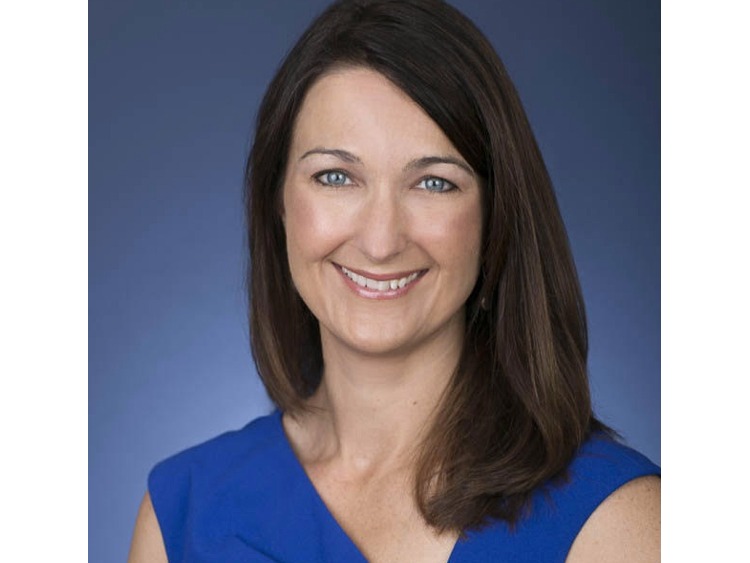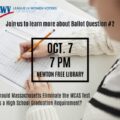Strong Focus on Improving Data and Performance Tracking
On August 31, newly hired Newton Public Schools Superintendent Anna Nolin met with Adam Bernstein (NPS parent and Fig City’s NPS writer) and Bella Ishanyan (Fig City student intern, Newton South High School senior, and Co-Editor-in-Chief of the school’s Lion’s Roar newspaper). The hour-long discussion has been condensed and edited for this article.
FCN: In your memos to the School Committee, you’ve cited the Portrait Of A Graduate exercise as one of your goals. What is that and why is it important?
AN: The district needs a North Star for how we want to operate. The profile of a graduate process asks, ‘What should every Newton graduate have when they leave us?’ That stakeholder process involves students, business leaders, higher education representatives, parents, faith communities, teachers, principals – everyone will have an opportunity to be heard. We will send information to every family and they’ll have a chance to participate. There will be a 4-day workshop in January for people who want to attend, and follow up outreach afterwards. Once we have our North Star, we then can plan our budget, design our instruction, hire for the people that align with those skills and competencies. An offshoot of that is the Profile of a Newton Educator. It’s the start of visioning work that sets us on a course so that we can all be rowing in the same direction. Right now there are a lot of competing values in the system, therefore we need to say what we’re aiming for as a unit.
FCN: Are you planning on incorporating students more into the schools’ decision making?
AN: I am. I’m also seeking a student advisory to the superintendent. The current School Committee (“SC”) student members may not be clear on what they’re able to speak about. We will also have a parent advisory and a staff advisory. Those are important to have in keeping your ear to the ground. I need the advice of the constituents I serve.
FCN: In recent School Committee campaigns, as well as in presentations by the NPS Diversity Equity, and Inclusion (“DEI”) office, race-based disparities in published statistics have been cited as evidence that NPS is failing its minority students in regards to discipline and academic performance. Do you agree with that and what are your thoughts on addressing these issues?
AN: Newton is not alone in having achievement disparities for black and brown students, students with English as a second language, and students with disabilities. There’s nothing unique about that. There was a brave telling of what that gap actually is. If we knew how to close those persistent gaps as a nation, there would be a recipe. Some places are making progress. In my prior district, two schools closed MCAS gaps for African-American students over two years. In Newton we have to look at which teachers are getting results, and scale those methods across the district.
A problem for Newton is there’s not a lot of baseline data sets for tracking performance. Other districts have benchmarking assessments, which are common assessments that we collect data on. This doesn’t happen in a systematic way in NPS in a lot of areas, making it harder to tell what makes a difference when addressing gaps. We’re trying a bunch of things but haven’t been doing assessments and measurements.
FCN: Other than MCAS statistics and DESE disciplinary statistics, what other assessments are there?
AN: Benchmark Skill Assessments examine skills from Kindergarten to 10th grade, in English, Language Arts, and Math on a more regular basis. I don’t think MCAS is the end-all-be-all, it’s a particular type of test. It tests skills and content coverage. However, skill benchmarking is NPS tracking on key areas like reading comprehension, mathematical fluency, and mathematical problem solving. Benchmarking means three times per year student snapshots are taken on those skills. You can’t study for it. When you have that in place, and also have an intervention system around that, when students don’t meet grade-level benchmarks, you intervene and give more help. Then you do progress monitoring tracking, and if still not grade level, the intervention continues. We don’t have those systems here consistently across the district.
We also don’t have across the district uniform teacher-created common assessments. For example, if we say that 9th grade history should have certain student outcomes, then across the city we should have teacher-created assessments, projects, or papers that we use as a common method to determine (a) if are educators teaching the expected skills, and (b) if are our kids mastering what they should be in grade 9. Research shows student assessments that are agreed-upon, designed, and scored by teachers get better results.
FCN: Related to getting Newton students extra help, in presentations to the School Committee, administrators and advocates for students with special needs have called Newton an “ableist” district, citing test score disparities and the Youth Risk Behavior Survey. Do you agree with this?
I don’t know if that’s a fair characterization of what those advocates are saying. I’ve spent time with Newton’s SEPAC leaders, and I’m in the same zone of thinking as they are. We need to separate testing and instruction. Testing is like a health check when you go to the doctor. How you design instruction is my shared point with the special needs community. I’m a curriculum geek, and how you design things to meet as many brains as possible is the joy and the jazz of being a teacher to me. What some of them have said is the district can operate in a very traditional way, by designing instruction a particular way and hoping everyone gets it. That can be an “ableist” way of doing business. If we don’t design for a lot of different learning needs, then we’re not being inclusive. That has the effect of pathologizing special education students who may just need material presented in a different format. Instead, a better upfront design facilitates all students blending in.
FCN: What have you learned about the personalities of Newton students, and how does that affect your goals?
AN: Since I started after the students left for summer vacation, I haven’t yet spent a lot of time with students yet, but look forward to getting to know them better in the fall. I did meet several students at the neighborhood meet-and-greets, and have a student intern working with me now on social media, who is also interested in policy. She’s helping me get students to interview for the Superintendent Secret Sauce Podcast. I’ve met a lot of students from Newton South theater, and like many of the students I have spoken with, they share worries about access to electives and courses. It seems like every kid in Newton is worried about budget cuts and losing their teachers every year. We want to pay a lot of teachers well, and we have a lot of teachers at the highest level of pay, so we need to make cuts if we have a budget that can’t sustain those teachers. The relationship between teachers and kids is everything. Another example is the South basketball team worried about equity and parity of facilities with North. We need to get the student advisory group ready.
Another anxiety of students is not getting all the courses they want. The other districts in Metrowest work together in collaboratives. We have a collaborative for digital courses. Natick has been 1-to-1 [one computer per student] since 2008; in Newton this just recently happened. Let’s say a student wants to study zoology. While Newton may not offer that, there could be a great teacher in another town who is known for being a superb zoology educator. An online zoology course could be offered to Newton students. American sign language, sports management, and investments are other examples of courses not every high school can offer, therefore we worked as a unit in Metrowest…
…This district really struggled with pandemic negotiations, when a lot of progress with online courses occurred elsewhere during this period. As an example within the district, right now kids at South don’t have music theory, but North offers it. If a student wants to go to Berklee, they need music theory. My husband is a musician, so I’m hearing a lot about that! I have a kid in college who’s a pharma major at UConn, he takes an online course every year, colleges expect that. I need to do more work on this issue, but can’t right now because we’re in this conflict mode regarding the contract negotiation.
FCN: It was new for an NPS superintendent to post on Newton’s Facebook groups, which you began doing a few months prior to your start. What is your philosophy behind that?
AN: I’m just watching and listening, I only get involved when there’s a safety issue or miscommunication, which is rare. There are also times where I’m celebrating things. However, we don’t put out information there that isn’t published in some other official way. It’s important because social media is one place where information is disseminated. I need to know how accurately we’re conveying information, and how families are perceiving that information. A lot of damage and some good gets done on those pages. I found in my prior positions it’s important to have an ear to the ground.
FCN: You’ve cited before the perceptions around NPS Excellence in other interviews. Are rankings important, and how has defining Excellence changed over the past 10 and 20 years?
AN: That is the question in this City right now. Part of the Portrait of a Graduate process is defining success as a district. I don’t think we want to leave it to Boston Magazine and US News. They change their metrics often, and many are not particularly helpful. For example how class sizes are a big part of those rankings, but they’re not necessarily indicative of Excellence.
We have to decide what we want as a system. I surmise that there will be a mix of kids demonstrating high achievement on traditional measures, and making sure more kids have access to the opportunity to be Excellent. At convocation, the MA Department of Education did a presentation on areas where Newton is far exceeding everyone else in the state, and asked what we’re doing to get these high results. The presentation also included places we’re not doing as well. It’s not like all Excellent or all not. I’ve heard from parents, ‘[NPS] used to be great in the 80’s but now it’s not’, however the same people say their kids had good experiences and were accepted into their preferred colleges.
My guess is that people are nostalgic about school. Parents often look for the same experiences as they had as markers for what’s normal and right. However, practices get updated through research and testing. When there’s a mismatch of experience, a different one sometimes feels bad. I hear things at meetings about how people’s children aren’t getting something, and they should have it. That’s up to the district to communicate what we’re doing. We haven’t done the ‘Why?’ behind some of the changes to sufficiently engage our community.
FCN: Along those lines, how do you intend to balance DEI practices with maintaining the traditional view of Excellence that some parents have recently advocated for?
AN: This is about access to excellence. It’s not a pie. If a traditionally equity-seeking group is given resources to achieve at the same level as traditionally dominant groups, the pie’s not getting smaller. Everyone should have resources to achieve. Those parents concerned with Excellence are worried their kids are being held to a lower standard while we catch up students who are struggling. Again, we need benchmarks and progress monitoring for this conversation too. We can’t hold back students who need to be challenged; benchmarking helps them also. That data piece is missing, so we’re instead talking in abstract terms like equity and excellence. We’re not tracking how kids are doing so we can’t offer personalized solutions. We need to build data dashboards, and train principals on how to use that data, so we can find where our areas of excellence and struggle are.
I’ve had many meet-and-greets with parents concerned about excellence, and they feel they’ve been painted with an anti-DEI brush. I can’t speak to their politics, but they’ve said they really just care about high quality, rigorous courses. If their kids are ready for another challenge, they should have another challenge. Parents are also concerned with college-level courses, however a student council member asked me how I will help them balance that academic pressure with finding our passions and having skills to live a life of meaning. To me, that’s the goal of the Portrait of a Graduate conversation that has to happen with kids and adults in the room at the same time.
In addition, and I’m aligned with the NTA on this, mental health supports need to be there, especially at the elementary levels. Creative things are happening at North and South; for example, Riverside is deploying mental health services in the buildings. This will be the first year that NPS gives out mental health surveys to all kids in Grades 3-8 to screen where they are. Just like academics, we should be monitoring mental health for students.
FCN: Since your July 1 start date, what have you observed about NPS that you didn’t know coming into the position?
AN: As part of the entry process, I’ve met with 165 staff, and have attended 34 meet-and-greets with residents around the city, and will try to outreach to neighborhoods and folks I haven’t heard from yet. Newton is such an amazing place to live and work, there are huge amounts of resources and activated people. In other communities, a lot of people have a lot of things to say but don’t participate and help, but Newton has a ‘volunteer army’ that many districts don’t have. I’m very excited about the focus and care on schools. Further, there are really nice quality of life aspects here that residents may simply be used to. It’s really different how plugged-in people are to the community. People identify with where they or their children attend, for example parents introduce themselves as ‘Cabot-Day-North’.
There are also some not positive observations. The current relations with the teacher’s union is something that’s completely foreign to me. I’ve had nothing but cordial relations with the NTA, but that hasn’t necessarily been reflected in public statements. I’ve only negotiated in the past using interest-based bargaining, which is more collaborative and based on shared goals. The district uses traditional bargaining, which is positional, and there appear to be ingrained habits.
Note that I’m currently the President of the Tri-County [Middlesex, Norfolk, Worcester] Roundtable of the Massachusetts Association of School Superintendents, and I’m also President of the New England Association of School Superintendents, so I have some perspective.
FCN: What are some examples?
AN: Typically when groups are in negotiations, in order to have psychological safety to be creative, there’s usually a norm that until the parties have an agreement, the negotiation details are not released into the public. I’ve been to two NPS bargaining sessions, then the process went to mediation, and several items were made public. Also what’s unusual is the superintendent in this district previously has not been involved in bargaining.
Another example is teachers using silent meetings during trainings, wherein they don’t speak or ask questions. Apparently that occurred [here] in negotiations in 2019, and because it was contentious and difficult, it was not addressed at that time. I don’t know how that will be addressed here, it may need a legal resolution, but it’s a whole new challenge. There’s a fundamental disagreement over whether taking away the opportunity for principals and staff to have conversations with each other constitutes a work stoppage.
FCN: Why do you think these things are happening in Newton now?
AN: I see the superintendent’s role as critical to ensuring health and collaboration between the teachers, school committee, parents, and administration, and there’s been a different style in the past. When I initially spoke to [NTA] President Zilles, we discussed moving to a more collaborative dialog, and Mr. Zilles said he had no issues with me personally, but that he was already down a certain path with the School Committee and Mayor.
Also, the state landscape has changed; there have been 3 other job actions recently in Andover, Dedham, and Wellesley. There’s been an uptick in the Massachusetts Teachers Association (MTA) expectations of local unions. All these things are in the mix in the dynamic around negotiations. Further, we could have been more aggressive negotiating to resolve the contract by this point in the calendar. Many districts start negotiations the previous fall and complete the new contract by June, then have a celebration. Obviously I’m new, but I’m just calling it like I see it.
FCN: A concern of students related to the negotiation is how does the district plan on ensuring that available teacher assistance, particularly after-school, is on par with previous years?
AN: In my previous school districts, in the contract there were specified provisions for extra help and after school hours that are expected. I don’t know what to expect in Newton in this moment. The Opening Day was eye-opening because things that were contractually expected did not appear to be happening. I hope students can expect that teachers will stick to those expectations, per the minutes and hours that are in the present contract. However, I’m not sure how the NTA will interpret work-to-rule.
Keep in mind, on Opening Day teachers did arrive to work, but did not attend the convocation. I was hired with the expectation that I’m to put district systems and structures [in place] to increase our efficacy, [and] that’s why the convocation was important. That doesn’t mean teachers didn’t do very fine work in their classrooms getting set up to kids. As is common in other districts, the convocation is used for the rollout of new initiatives like the statewide IEP tool; there are lots of things that happen on those training days. At ours, we discussed district goals for the year, and the Massachusetts Department of Education Secretary spoke about new outcomes and expectations for teachers. Those have direct bearing on the teacher recertification process and goal-setting. Being there together helps with alignment and professional development.
Also, there were several work actions at the principal and building level after the convocation. All but three buildings had silent meetings later that day. Those building trainings can include safety and crisis procedures, medical procedures, expectations for lesson design and construction, and level-setting for defining rigorous and culturally responsive instruction. Each building may have a different emphasis. We had 150 new staff come to NPS this year, these trainings are important. Teachers care deeply about kids, and they will be personally ready for the year, but we have district training obligations.
Many things can be true at once. I do believe everyone is doing what they think is right and best, both for the profession and for the students. This is a complex situation. Although I can’t take credit nor blame for the current state of NPS, I’m watching the current conditions.
Principals spent last week trying to manage upset teachers. Some asked principals for directives, but that’s not how we lead; we lead by creating collaborative agendas. I had to make a directive for opening day because there had previously been loose expectations for what professional development days mean. That’s a critical day for setting the tone and welcoming people back. Unfortunately the tone we set was one of tension. I received several apology notes from teachers saying they knew they should have attended the convocation but had to keep solidarity with the union. The hundred people who did attend said it was inspirational and informative, [and] one told me this is what they’ve been wanting, to have opening days like this.
FCN: What is your favorite memory from high school?
AN: My favorite memory is a person. The reason I’m in education is my high school English teacher, Bob Corrigan, changed my life. I’m one of nine girls, from a family in northern New Hampshire. My dad was pretty traditional, college wasn’t really in his sights for me. Both of my parents are blue collar, vocational trained people that were skeptical of the costs. Bob went to bat for me. He helped me study for the SAT, and hired me to correct papers so I could have cash to pay for applications. Bob spoke to my dad about letting me go to college. When I graduated from college, my dad said he didn’t realize that people like us could do these things, and after that he paid for all my sisters to go to college.
In the classroom, the first time Bob spoke to us about utopia novels and gave us the opportunity to critique our own world through that utopian lens, I was hooked on literature, analysis, and how to make the world better. I want every kid to have that with their teachers, to have that connection and care.
FCN: Five years from now what do you want to look back on as accomplishments?
AN: I hope we’re coming to the end of our first 5-year strategic plan, and have a plan for the next five. I hope we can celebrate successes from that plan. I hope I still have all the energy to do the job, and that we’re out of this current way of negotiating contracts and have a respectful, forward-thinking healthy way of doing that for our kids and our teachers. This is my lifelong profession, I was a teacher for many years; I want a strong contract for teachers every year. I also want to be able to afford it. In five years, I’ll know that balance better, and we’ll be able to lead this process in a way that will make every constituent proud.
I also think we will continue to amplify both the excellence and the equity in NPS, and bring those together in a way that’s really special. One of the reasons I came to Newton is because of the diversity of the city and the student body, and the resources here, and quite honestly the conflict here too. If we can figure out how to do this, we can be a model for the nation. We’ll know how to do something really important for education. I hope we’re at the point where we can share with other districts how our success worked.







